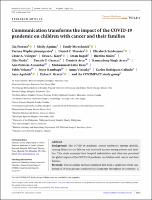Communication transforms the impact of the COVID-19 pandemic on children with cancer and their families

Author
Date
2023-06Permanent link
https://hdl.handle.net/11351/9963DOI
10.1002/cam4.5950
ISSN
2045-7634
WOS
000975504400001
PMID
37081718
Abstract
Background
The COVID-19 pandemic altered healthcare systems globally, causing delays in care delivery and increased anxiety among patients and families. This study examined how hospital stakeholders and clinicians perceived the global impact of the COVID-19 pandemic on children with cancer and their families.
Methods
This secondary analysis examined data from a qualitative study consisting of 19 focus groups conducted in 8 languages throughout 16 countries. A codebook was developed with novel codes derived inductively from transcript review. In-depth analysis focused on the impact of the COVID-19 pandemic on children with cancer and their families.
Results
Eight themes describing the impact of the pandemic on patients and their families were identified and classified into three domains: contributing factors (COVID-19 Policies, Cancer Treatment Modifications, COVID-19 Symptoms, Beliefs), patient-related impacts (Quality of Care, Psychosocial impacts, Treatment Reluctance), and the central transformer (Communication). Participants described the ability of communication to transform the effect of contributing factors on patient-related impacts. The valence of impacts depended on the quality and quantity of communication among clinicians and between clinicians and patients and families.
Conclusions
Communication served as the central factor impacting whether the COVID-19 pandemic positively or negatively affected children with cancer and families. These findings emphasize the key role communication plays in delivering patient-centered care and can guide future development of communication-centered interventions globally.
Keywords
Pediatric cancer; Psychosocial studies; Quality of lifeBibliographic citation
Ferrara G, Aguina M, Mirochnick E, Wiphatphumiprates P, Moreira DC, Sniderman E, et al. Communication transforms the impact of the COVID-19 pandemic on children with cancer and their families. Cancer Med. 2023 Jun;12(11):12813–26.
Audience
Professionals
This item appears in following collections
- Col·lecció especial COVID-19 [945]
- HVH - Articles científics [4476]
The following license files are associated with this item:

 Private area
Private area Contact Us
Contact Us







